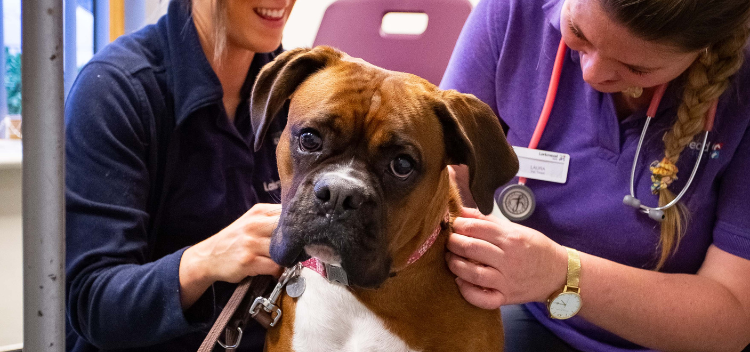
Dogs, cats, rabbits, guinea pigs, and other pets can pick up a variety of parasites. Most commonly, worms and fleas, which are active all year round and ticks which are more active in warm, wet months. All of these can affect your pets, your human family, and your home, so preventative action is important.
The variety of parasite control methods on offer can be daunting, so our friendly team at Larkmead will help you choose the best products for each individual pet. These include spot-on applications, chewable treats, tablets and collars. We will also explain to you how the products work, which parasites they are effective against and provide reminders to help you remember when to use them.
Our Lifetime Care Club is a great way to spread the cost and save money on routine flea, worm, and tick products as well as other preventative pet care.
Discover more about our Lifetime Care Club.
Fleas are small jumping insects, 1-3mm long and reddish brown in colour. They feed on their host’s blood (any mammal including humans) and in doing so cause intense itching. In some animals this can cause an allergic reaction and lead to skin infections and severe hair loss.
Fleas breed rapidly laying up to 50 eggs a day, so you can have an infestation in your home before you know it, causing an uncomfortable situation for everyone involved. Modern central heating means that our homes are a perfect year-round environment for fleas to live and multiply in if uncontrolled.
The best products are designed to break the flea life cycle either by killing the adults before they can lay eggs or by preventing eggs developing into adults. With so many flea products available these days it is important to understand which to choose as they are not all as effective as each other.
Worming our pets is important both for their health and yours. Worms can be found both in the intestine and the respiratory tract of our pets and some pose a risk to humans too. Often, they are picked up from contact with soil, faeces and hunting rodents. Fleas can also carry tapeworms. Puppies may become infected while in the womb and both puppies and kittens can be infected while feeding from their mothers.
While may pets may tolerate the occasional worm, heavy burdens can cause weight loss, lethargy, diarrhoea or intestinal blockage and respiratory symptoms.
If you are planning travel abroad it is also important to understand how to prevent infections that we do not currently have in the UK.
Our team will be able to assess your pet’s lifestyle and advise you on the best product and frequency of worming for each individual.
Ticks are parasites which feed off the blood of their hosts. They are extremely important as they can carry and transmit viruses and bacteria between mammals including the bacteria which causes Lyme disease in humans. Infections are transmitted in the tick’s saliva as it feeds. Several types of tick are endemic in the UK. Most appear on our pets as small, well attached parasites that are light grey or reddish brown in colour. They can vary in size from 3-4mm to 0.5cm in diameter.
Ticks are more prevalent in certain areas of the UK during spring and summer but can be problematic all year round.
Always use the correct tool (a tick hook) to remove a tick – never twist/pull/burn or suffocate them as this may result in the mouthpart remaining and a reaction developing on your pet’s skin.
Please speak to a member of our team to discuss the most effective tick prevention treatment for your pet.